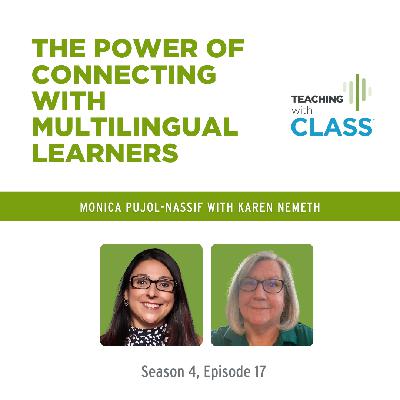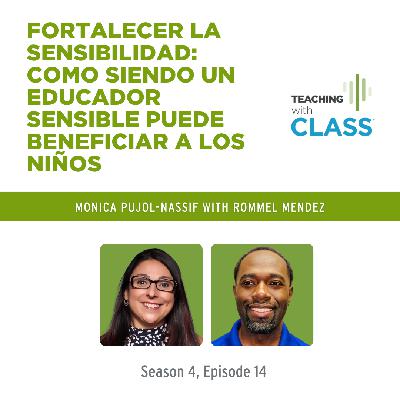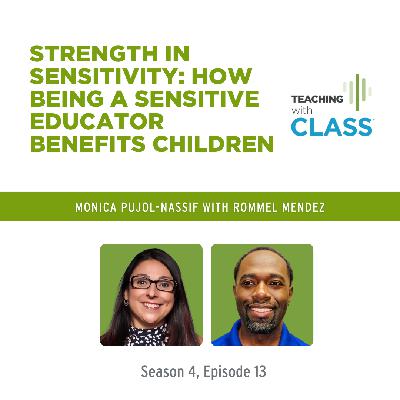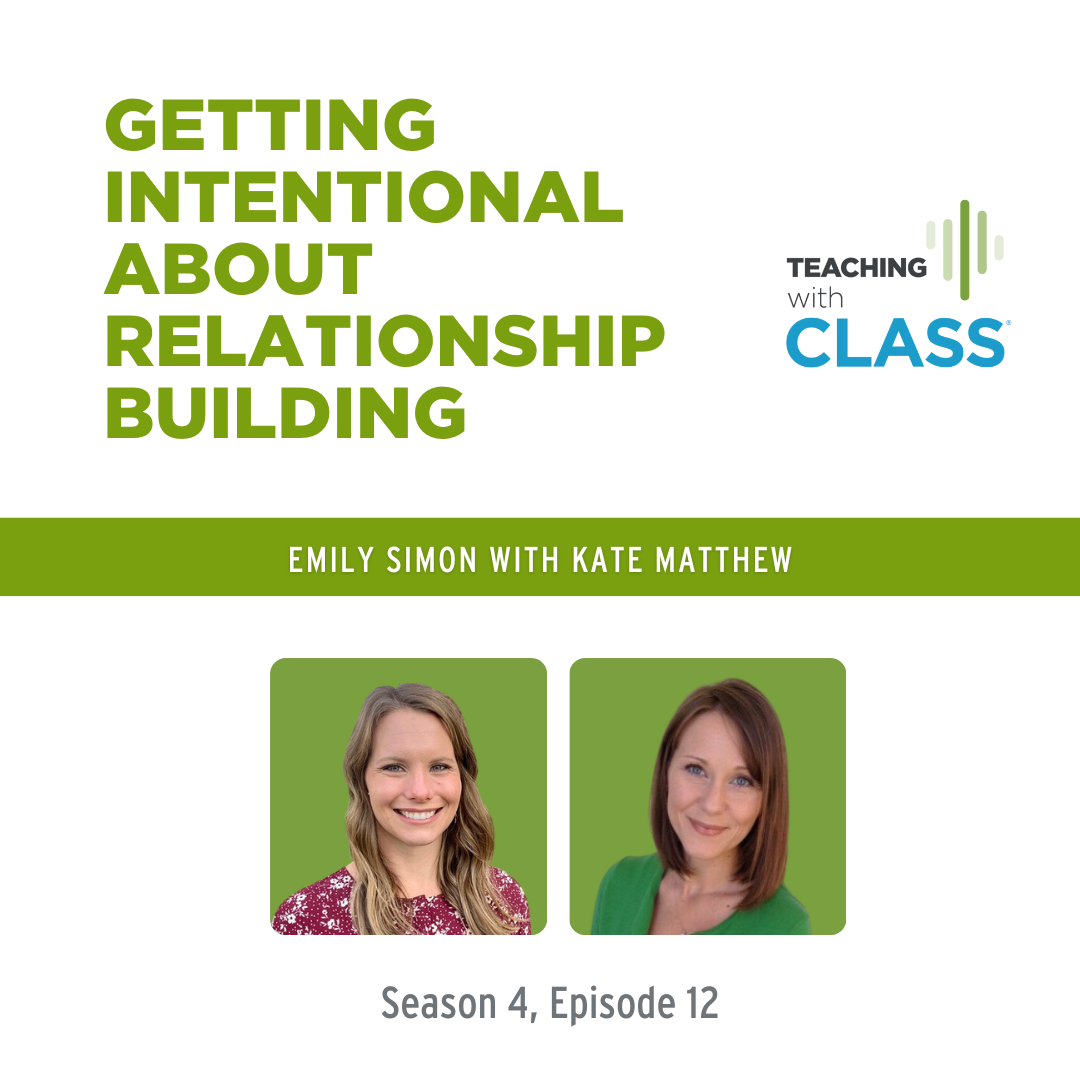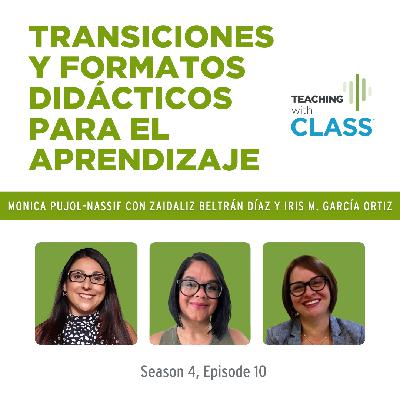Discover Teaching with CLASS®
Teaching with CLASS®

Teaching with CLASS®
Author: Teachstone Inc.
Subscribed: 25Played: 147Subscribe
Share
© Teachstone Inc.
Description
Explore topics that are important to you while getting tactical strategies you can implement right away in your classroom! Each episode dives into a specific aspect of teaching and offers short, helpful strategies you can add to your practice.
Interested in learning more or have a suggestion? Email us at: podcasts@teachstone.com
Produced by Teachstone
Interested in learning more or have a suggestion? Email us at: podcasts@teachstone.com
Produced by Teachstone
66 Episodes
Reverse
En este episodio, Mónica Pujol-Nassif conversa con Elizabeth Horberg, una experimentada psicóloga y coach educativa con amplia trayectoria en programas como Montessori y Head Start. Juntas exploran la profunda relación entre la música y el lenguaje en el desarrollo infantil, compartiendo anécdotas, estrategias y beneficios de incorporar la música en la enseñanza.
Puntos clave del episodio:
La música como el primer lenguaje: Desde antes de nacer, la música conecta emociones y cogniciones, sirviendo como un medio universal de comunicación.
Beneficios de la música en la primera infancia:
Autorregulación emocional: Historias personales de cómo la música ayuda a calmar y reconfortar a los niños.
Desarrollo de la memoria: El impacto duradero de la música escuchada desde el útero.
Facilitación del lenguaje: Canciones que enseñan turnos, reciprocidad y habilidades lingüísticas básicas.
Estrategias para educadores: Consejos prácticos para integrar la música en las aulas, fomentando el lenguaje y la autorregulación en niños desde temprana edad.
Momentos destacados:
(01:08) Presentación de Elizabeth.
(03:56) La música como vehículo para el desarrollo cognitivo y emocional.
(05:09) Anécdotas personales sobre el impacto de la música en la vida de los niños.
(10:18) Estrategias para implementar música y lenguaje en la educación diaria.
Frase inspiradora:
"La música es el lenguaje universal de la humanidad." — Henry Wadsworth Longfellow, citado por Elizabeth.
Recursos mencionados:
Métodos Montessori.
Estrategias de Head Start para el desarrollo infantil.
There are a lot of conflicting thoughts on infant care. Join us for the second part of our discussion with Johayra Bouza, an expert in child development, as she shares her insights, debunking myths like the cry-it-out method and the misconception that infants act intending to spite their caregivers.
Respect for diverse family cultures and caregiving choices is at the forefront of our discussion, emphasizing the importance of gentle, respectful communication. Johayra offers practical strategies for nurturing healthy infant development, ensuring caregivers are well-equipped to support their young ones through pivotal developmental stages.
Topics Discussed in This Episode
[00:02:32] The myth of the cry-it-out method
[00:03:52] Suggesting different infant-care methods while respecting the family’s culture and choices
[00:05:51] Debunking the notion that infants act with spite
[00:07:38] Debunking the concept of “spoiling” an infant
[00:10:40] Research from a Romanian Orphanage and what it showed
[00:12:17] Understanding the potential developmental impacts of early screen exposure on infants
[00:15:34] Johayra’s final thoughts about the important work early educators are doing
Resources
Kate Cline
Johayra Bouza
Unlock the secrets to fostering emotionally intelligent classrooms. In today's discussion, we dive into the pivotal role of emotional intelligence in supporting Black children who have faced adverse childhood experiences (ACEs). Our guest, LeTosha White, vice president of the Chicago affiliate of the Black Child Development Institute, joins host Kate Cline to share invaluable insights. Together, they explore how self-awareness, empathy, and other components of emotional intelligence can transform classrooms into nurturing spaces that foster resilience and growth for Black students.
In this episode, we unpack the critical components of emotional intelligence and their importance in creating emotionally supportive classrooms for Black children who have experienced ACEs. LeTosha White discusses the lasting impacts of ACEs and how emotionally intelligent environments can mitigate these effects. The conversation highlights the need for educators to develop their own emotional intelligence, focusing on self-awareness and empathy to create unbiased, nurturing learning spaces. Real-life examples illustrate how addressing personal biases and triggers can lead to more supportive responses to student behavior. Additionally, the episode emphasizes the importance of self-care for educators, reinforcing that thriving teachers are key to fostering thriving students.
Topics Discussed in This Episode
[00:02:21] How Letosha connects to the issue of emotional intelligence in the classroom.
[00:03:23] What brought LeTosha to where she is today.
[00:04:28] Defining emotional intelligence
[00:05:14] The five skillsets within emotional intelligence
[00:06:32] What ACEs (Adverse Childhood Experiences) are
[00:08:45] How educators can start being more aware
[00:10:32] How to build self-awareness
[00:13:57] Understanding empathy
[00:19:18] Becoming aware of biases
[00:21:25] Coaching a teacher through biases
[00:28:51] Specific ways to support Black children in the classroom
[00:30:43] Encouraging educators to build bridges
Resources
Kate Cline https://www.linkedin.com/in/kate-cline/
LeTosha White https://www.linkedin.com/in/letoshawhite/
En este episodio, tenemos el placer de conversar con la doctora Johayra Bouza, una experta en psicología del desarrollo con más de 14 años de experiencia en el campo de la primera infancia. Johayra, orgullosa inmigrante cubanoamericana, nos relata cómo los educadores jugaron un papel fundamental en su desarrollo tanto personal como profesional.
Con una licenciatura en psicología, una maestría en estadísticas, y un doctorado en psicología del desarrollo, Johayra nos comparte su visión sobre la importancia crucial de la educación temprana. A lo largo de la entrevista, exploramos su experiencia y cómo su formación académica y práctica le ha permitido impactar positivamente en la vida de los niños y las familias con las que ha trabajado. Es una conversación que resalta la conexión entre educación y desarrollo en el primer año de vida.
Tópicos discutidos en este episodio:
[00:35] La trayectoria de Johayra Bouza
[03:50] El desarrollo del cerebro en el primer año de vida
[06:14] Estrategias para apoyar el desarrollo del cerebro y el apego
[11:28] Mitos sobre los infantes
[17:50] Sobre estimulación del infante y cómo evitarla
In this episode, Jill Kuck shares her transformative journey from classroom teaching to diagnostics, highlighting the importance of community involvement and seeking help to meet the diverse needs of students. The discussion covers essential elements of early childhood behavior management, including setting clear behavior expectations, managing social interactions, and resolving conflicts.
Jill emphasizes the significance of early childhood development principles and the importance of monitoring concerning behaviors. The episode also focuses on empowering educators by prioritizing self-care and adopting a student-centered teaching approach, offering practical tips for creating a supportive atmosphere where both teachers and students can thrive.
Topics Discussed in This Episode
[00:00:00] Introduction
[00:02:06] How Jill personally connects to the topic of making sure all children's needs are met
[00:03:12] Jill’s background and how she got to her current role
[00:05:00] Shifting from teaching preschool to the role of a diagnostician
[00:07:48] Special education language and definitions
[00:08:56] Basic building blocks for meeting children’s needs
[00:10:47] Setting boundaries in the classroom
[00:13:23] When to start worrying about a child
[00:15:52] Tracking behavior and language and learning challenges
[00:19:30] Specific examples of recognizing a problem
[00:21:01] What to say or not say when talking to parents
[00:23:55] Who to reach out to to get support for a child
[00:25:58] The referral and evaluation process
[00:30:09] Avoiding discouragement and staying motivated to come back every day
[00:32:33] Jill’s encouragement for educators
Resources
Kate Cline
Jill Kuck
What happens when a teacher blends over three decades of experience with unwavering consistency, respect, and love? Paul Klein joins us to reveal the secrets to diffusing negative classroom climates. Drawing from personal anecdotes and a wealth of knowledge, Paul highlights the pitfalls of a classroom plagued by anger, frustration, and punitive control, and shares his tried-and-true methods for fostering a positive environment where every student feels valued.
In our discussion, we emphasize the vital role of building positive relationships with students, especially in pre-K classrooms. We cover the importance of creating personal connections, meeting students where they are, and nurturing a supportive community. Through heartfelt stories, we illustrate how understanding a student's background and interests can empower them to take risks and grow. One tale stands out, showcasing how open communication and addressing unique challenges can transform a student's behavior and boost their confidence and success.
Topics Discussed in This Episode
[00:00:00] Introduction
[00:01:39] Paul’s connection to the topic of reducing negativity in the classroom
[00:04:13] Paul’s background and experience
[00:04:57] Defining negative climate
[00:09:14] Heading off negativity before it has a chance to start
[00:11:11] Individualizing relationships with students
[00:15:50] Setting children up to succeed in the classroom
[00:19:17] Building a relationship with a student who’s feeling negative
[00:22:26] Avoiding being sarcastic or disrespectful to students
[00:24:37] Staying in a calm, centered place when things go sideways
[00:29:30] The power of non-response
[00:32:18] How building your own sense of self and peace contribute to handling negative things in school
[00:37:59] What Paul would say to educators who need encouragement
Resources
Kate Cline
Paul Cline
What happens when an educator blends warmth, empathy, and genuine connection in the classroom? On this episode of Teaching with Class, we have the pleasure of hosting Crystal Allen, an experienced educator and instructional specialist from Louisiana. Crystal opens up about her remarkable journey from teaching young students to supporting adult educators. She passionately emphasizes fostering a positive climate in educational settings, where trust and respect can flourish among students and teachers alike.
Crystal Allen is a mother of 3 and a native of Louisiana with 18 years of experience in education. She’s served as a classroom teacher, school-based instructional specialist, mentor coach, district instructional specialist, and session facilitator. Crystal is currently the Early Childhood Coordinator for the EBR Ready Start Network. She has worked with the early childhood department since 2018.
Today, Crystal shares invaluable insights about how educators, even those who aren't naturally extroverted, can create a positive atmosphere through small yet impactful actions. Authenticity is key, and Crystal underscores how being genuinely interested in students' lives can foster a sense of value and trust. Whether it's attending a student's event or simply noticing the little things, these actions build stronger relationships.
Topics Discussed in This Episode
[00:00:00] Introduction
[00:01:31] Crystal’s story and history in education
[00:03:02] Crystal’s background and education
[00:05:49] What a positive climate in the classroom is and how to build one
[00:07:51] Positive doesn’t mean perfect
[00:09:14] How warm relationships and respectful and positive communication benefit children and adults
[00:12:29] How a positive climate sets people up for learning
[00:15:21] How a teacher who is more naturally reserved can still create a positive climate
[00:16:49] The importance of authenticity
[00:19:26] How to make sure every child benefits from a positive climate
[00:22:44] How to relate well to other adults as well as children
[00:26:41] Things teachers can try right away in their classrooms
[00:28:29] The disconnect of technology
[00:30:12] Crystal’s encouragement for educators
Resources
Kate Cline
Crystal Allen
Can empathy and understanding truly transform a classroom environment? Today we hear from Judy Cuevas, an experienced educator and coach, who shares her invaluable insights on creating emotionally supportive classrooms. Judy opens up about her personal journey and the key elements that foster a positive climate, teacher sensitivity, and regard for child perspectives. Get ready to discover practical tips that will empower you to recognize and respond to children's cues, laying the foundation for a safe and engaging learning space.
In this episode, we also shed light on the significance of cozy, quiet areas where children can decompress and reflect—an often-overlooked aspect of emotional well-being. Judy discusses how these spaces can serve both students and educators, providing a respite from the daily stresses of classroom life. Plus, we dive into strategies for educators to better understand and support their students' emotional needs through curiosity, self-reflection, and modeling behavior.
Topics Discussed in This Episode
[00:00:00] Introduction
[00:01:06] Why emotional support matters
[00:02:01] Judy’s background
[00:03:58] How Judy would describe emotional support
[00:05:00] What kinds of things happen in classrooms with great emotional support
[00:07:22] How to look for children’s cues
[00:10:12] Supporting teachers in self-reflection
[00:13:58] Setting the scene for building emotional support in a classroom
[00:16:26] Starting the school year off on a good in a good pathway for emotional support
[00:19:35] Ways to connect with new students and start building a relationship
[00:22:42] The importance of asking children about their feelings rather than making assumptions
[00:24:28] One thing a new or experienced teacher could try at the start of the new school year
[00:25:46] Implementing self-reflection a couple of times a day
[00:26:39] Modeling the behavior you want to teach and looking for what else you can learn
[00:28:14] What Judy wants educators to know
Resources
Kate Cline
Judy Cuevas
In part two of our heart-to-heart conversation about understanding trauma in the classroom, Megin Ruston illuminates the path to empowering educators to step into their roles as unwavering advocates for their young charges. We discuss understanding the profound impact of trauma on a child's brain and behavior and equipping oneself with the tools to manage those critical dysregulated moments.
By embracing self-care and emotional regulation, teachers can become the bedrock upon which children can rebuild their sense of safety and learn to express and regulate their own emotions. From the practicality of visual aids for emotional communication to the subtleties of co-regulation, this conversation is a treasure trove of insights.
Topics Discussed in This Episode
[00:00:00] Introduction
[00:03:00] Strategies that teachers can use to help meet children’s regulation needs as well as their own
[00:07:43] Supportive interactions educators can have with children
[00:12:45] Where to go after understanding what the child is going through
[00:18:05] What to do once both teacher and child are calm
[00:21:45] The ripple effect of individualizing your response to one child
[00:24:35] The importance of establishing a trusting relationship
[00:25:11] Big takeaways from this conversation
[00:26:53] The importance of supports for teachers
[00:27:44] The message of encouragement Megin would share with educators
Resources
Kate Cline
Megin Ruston
This is the first of a 2-part series where we’ll unpack the complexities of childhood trauma and its profound effects on young minds. Megin Rustin, a seasoned early childhood educator and adoptive mother, shares her wealth of knowledge and personal insights on this critical topic.
Listen in as we explore the scientific intricacies of the developing brain, discussing how regions like the amygdala and hippocampus respond to trauma and how these responses can have lasting implications into adulthood. Our conversation offers a heartfelt blend of professional expertise and real-life experience, shedding light on the often unseen challenges children face due to traumatic experiences.
Topics Discussed in This Episode
[00:00:00] Introduction
[00:01:26] Why the topic of trauma is so important to Megin
[00:02:45] Megin’s role with Teachstone
[00:03:23] How Megin was involved in early childhood education before Teachstone
[00:05:31] What is defined as trauma
[00:06:25] How the brain functions under traumatic circumstances
[00:09:54] The things that start happening in the brain that affect its development when a traumatic event occurs
[00:13:16] What’s happening in the brain when young children are experiencing chronic stress
[00:15:36] The meanings of dysregulation and regulation
[00:18:30] How children learn how to calm down and regulate themselves
[00:22:08] The adult’s role in the regulation process
[00:23:47] Step 2 of co-regulating
[00:26:21] Why timeouts aren’t effective and how that relates to regulation
[00:31:40] Why you need to be aware of a variety of strategies because we need to meet individual children's needs
Resources
Kate Cline
Megin Ruston
En el episodio de hoy tenemos a Zaidaliz Beltrán e Iris García como invitadas, ambas iniciadas como maestras de preescolar en Head Start y actualmente consultoras en varios programas de Head Start en Puerto Rico y afiliadas CLASS Trainer - Pre-K. Iris y Zaidaliz han trabajado juntas por más de 20 años, les gusta viajar, entrenar y hacer largas caminatas.
En esta conversación escucharás la importancia de planificar transiciones entre las actividades a lo largo del día, cómo benefician estas transiciones al desarrollo de las funciones ejecutivas cuando son bien implementadas y algunos ejemplos de cómo hacerlo apropiadamente.
This episode dives into the world of special education, focusing on the importance of individualized interactions in the classroom. Today’s guest, Mary-Margaret Gardiner, a seasoned educator, shares her insights and experiences in working with special needs children.
The discussion ranges from understanding each child's unique cues and needs to effective strategies for classroom observations. Mary-Margaret highlights the importance of understanding each child's individual needs and cues, and how teachers can use that understanding to foster powerful interactions that support unique learning styles.
Topics Discussed in This Episode
[00:01:38] Mary-Margaret’s background
[00:05:19] How the guiding principles of CLASS® 2nd edition apply to all children, including those with special needs
[00:07:41] How teachers can effectively interact with children who don’t like to interact
[00:11:51] Attending to the needs of children with and without special needs in the same classroom
[00:18:16] Addressing challenges in interacting with children who have developmental delays
[00:22:29] What observers need to know about special needs when they go observe a classroom
[00:28:27] Which tools observers use
[00:31:30] Strategies Mary-Margaret wants educators to know
Resources
Mary-Margaret Gardiner
Resources for Educators
Recommendations for Using CLASS in Inclusive Early Childhood Programs
Unravel the world of bilingual education with our special guest, Karen Nemef, a celebrated author, consultant, and staunch advocate for high-quality early learning experiences for young multilingual learners. Throughout this episode, Karen enlightens us on the power of bilingualism, offering a profound understanding of what it means to be a dual language learner and the importance of connecting with these children in their languages, regardless of their proficiency level.
Karen brings her expertise to bear as she shares fascinating research-backed evidence, demonstrating that supporting a child's home language not only helps them excel in English but in other languages too. She discusses the concept of "banking time" when teacher and student speak different languages, offers practical tips on how to engage with a child who speaks a different language, and emphasizes the critical role of building a genuine connection with the child through nonverbal skills and shared play materials.
Topics Discussed in This Episode
[00:00:51] Karen’s background and current role
[00:04:25] How to define a multilingual or dual language learner
[00:06:50] The strength of bilingualism
[00:07:19] What interactions look like when children and teachers speak different languages
[00:09:39] What the research says about how multilingual learners can thrive in the early childhood education setting
[00:13:52] How teachers can learn to interact with students in their home languages
[00:16:39] Training teachers on the importance of listening
[00:17:50] Banking time when you don’t speak the same language as the child
[00:23:02] The multiple reasons to involve the parents and family of the child
[00:24:27] Key takeaways for teachers to practice with their students
Resources
Karen Nemeth
Karen on Facebook
ELLs / DLLs in Early Childhood on LinkedIn
Language Castle
En los últimos años se ha visto un aumento en las conductas desafiantes en el salón de clases. El trauma tiene mucho que ver con este comportamiento, por lo que hoy tenemos a la Dra. Johayra Bouza, para ayudarnos a entender la conexión que existe entre lo que se vive en casa y lo que sucede en el salón de clases, así cómo desarrollar estrategias para navegar los eventos de conducta desafiante y cómo comunicarlo a las familias para fomentar que estas estrategias también se apliquen en casa.
Tópicos discutidos en este episodio:
[04:16] ¿Cuáles son las razones del comportamiento desafiante?
[07:38] ¿Cómo manejar la frustración y controlar los comportamientos desafiantes?
[17:30] Conectar con las dos partes del conflicto.
[21:52] ¿Cómo comunicar las conductas desafiantes a los padres?
[27:10] ¿Cómo fomentar que las familias se conecten con los niños y niñas en casa?
[29:20] Estrategias para implementar desde hoy.
In today’s episode, we explore the difficult topic of student trauma and challenging behaviors in the classroom. Joining us today is Dr. Johayra Bouza, an educator who has walked the path from poverty to academia thanks to the dedication and support of her teachers. Dr. Bouza brings her rich insights and practical advice to address these pressing issues that have been amplified due to the pandemic and its associated social isolation.
Throughout this episode, Dr. Bouza provides invaluable advice on how to manage student trauma and challenging behaviors in the classroom. She underscores the importance of recognizing the trauma that educators themselves may be undergoing and shares effective coping strategies. From deep breathing exercises to setting boundaries and validating emotions, Dr. Bouza offers a range of strategies to handle difficult situations. Additionally, she discusses the critical role of understanding the child, engaging them in calming activities, and fostering positive parent-educator relationships.
Topics Discussed in This Episode
[00:00:39] Dr. Bouza’s background and current role
[00:05:22] The reasons for changing student behaviors and more challenging behaviors
[00:07:23] The kinds of behaviors students are exhibiting in the classroom these days
[00:09:09] Ways to cope with more challenging behaviors
[00:17:50] Communicating with parents about challenging behaviors
[00:26:06] Strategies teachers can share with families to help them connect with their students
[00:29:04] Concrete strategies teachers can use for children exhibiting challenging behaviors
Resources
Dr. Johayra Bouza
Hoy está con nosotros Rommel Mendez, maestro de niños pequeños en CPLC EHS-Phoenix. Con más de 10 años de experiencia trabajando con CPLC, Rommel viene a conversar sobre cómo la sensibilidad en el salón de clases puede ser una herramienta para entender mejor a tus estudiantes y facilitar el proceso de adaptación de las lecciones, resultando en una mejor experiencia en el salón de clases.
Tópicos discutidos en este episodio:
[02:39 - 04:04] Sensibilidad del maestro y la maestra para generar confianza en los niños.
[04:04 - 06:19] ¿Cómo afecta la sensibilidad del maestro al comportamiento del niño en el salón de clase?
[06:19 - 10:54] ¿Cómo manejar los momentos de sobrecarga sensorial?
[11:07 - 14:07] Planificar actividades tomando en cuenta la individualización.
[14:07 - 17:12] Adaptaciones de las lecciones sobre la marcha y cómo afecta los cambios en la rutina.
[17:12 - 21:54] Estrategias que puedes implementar desde hoy.
In today’s episode, Rommel Mendez, a toddler educator with over a decade of experience, shares his valuable insights and practical strategies for fostering trust, sensitivity, and emotional security in the classroom.
His approach emphasizes meeting children where they are, understanding their unique needs, and equipping them with tools for self-regulation. The conversation also touches on adapting activities to cater to individual needs and interests, fostering relationships with parents, and handling issues like sensory overload.
Topics Discussed in This Episode
[00:01:05] Rommel’s background and current role
[00:02:57] How teachers can build trust with toddlers
[00:05:08] How teacher sensitivity impacts behavior in the classroom
[00:07:40] How to help individual students with problems like sensory overload
[00:09:35] Maintaining mindful expectations for students and modeling behaviors
[00:12:23] Promoting growth and development in a sensitive way
[00:16:53] Combining sensitivity with adaptability
[00:18:09] Strategies that teachers can implement immediately to adapt activities or increase their awareness and responsiveness
In this episode, we discuss the profound impact of classroom relationships on learning and development. Today’s guest is Kate Matthew. Kate is a co-author and Project Director of the STREAMin3 curriculum model from the Center of Advanced Study of Teaching and Learning (CASTL) at the University of Virginia. Today she shares enlightening insights that underscore the crucial role that relationships between educators and students play in shaping successful learning environments.
Drawing from her wealth of experience, Kate shares practical strategies and innovative techniques such as 'banking time', a unique approach aimed at bridging the gap with students who find connection challenging. Listen to today’s conversation to learn about how educators can fortify these critical relationships by offering choice and autonomy activities coupled with acceptance, interest, and responsiveness.
Topics Discussed in This Episode
[00:00:56] Kate’s background and current role
[00:02:05] Ways for educators to start thinking about their relationships with their students
[00:05:23] What educators can do to foster their relationships with children
[00:11:24] Making relationship-building a priority
[00:14:12] Weaving relationship-building into academics
[00:15:13] What to do when forming relationships doesn’t come easily and how banking time can help
[00:19:05] How to unlock the relationship superpower in the classroom
[00:20:17] More resources for listeners
Resources
Kate Matthews
Streamin3 Curriculum
ECE Resource Hub
Banking Time
The process of fostering children's critical thinking and problem-solving skills can be challenging yet rewarding. In today’s episode, you’ll hear an enlightening conversation with early childhood education expert, Shawn Kaplan, about the art of cultivating thoughtful interactions in children and unlocking their cognitive abilities.
With 30 years of experience in the Early Education sector, Shawn Kaplan has supported Teachstone, the Los Angeles County Office of Education (LACOE), and local school districts as a consultant with CLASS-related learning applications and improvement plans. Shawn has also supported Family Child Care programs as a Quality Coach, worked in infant through PreK in both private and public programs, held leadership roles in the private sector, and managed non-profit programs.
Listen to the episode to hear Shawn’s insights on fostering critical thinking and problem-solving skills in children. The episode offers practical advice on enhancing children's cognitive abilities, understanding their non-verbal communication, and promoting their inherent creativity. Furthermore, Shawn introduces us to the innovative Architects of the Mind program, which aims to nurture advanced problem-solving skills in children.
Topics Discussed in This Episode
[00:00:50] Shawn’s background
[00:01:44] What it means to have children explain their thinking
[00:02:44] How explaining their thinking helps children develop cognitive skills
[00:05:41] Ideal moments for these interactions between students and teachers
[00:09:38] Leaning into transitions
[00:12:26] Reminders teachers can use to push that kind of thinking in students
[00:14:48] How asking students to explain their thinking connects to the other four indicators of quality of feedback
[00:18:38] How to have these kinds of interactions with children who are non-verbal or special needs
[00:21:01] How educators can balance guidance and allowing children to think independently
[00:23:48] Strategies for teachers to implement in the classroom
[00:26:24] Encouragement and grace for educators
Resources
Shawn Kaplan
En el episodio de hoy tenemos a Zaidaliz Beltrán e Iris García como invitadas, ambas iniciadas como maestras de preescolar en Head Start y actualmente consultoras en varios programas de Head Start en Puerto Rico y afiliadas CLASS Trainer - Pre-K. Iris y Zaidaliz han trabajado juntas por más de 20 años, les gusta viajar, entrenar y hacer largas caminatas.
En esta conversación escucharás la importancia de planificar transiciones entre las actividades a lo largo del día, cómo benefician estas transiciones al desarrollo de las funciones ejecutivas cuando son bien implementadas y algunos ejemplos de cómo hacerlo apropiadamente.
Tópicos discutidos en este episodio:
[02:12 - 06:46] ¿Cuántas transiciones se hacen en el día? Y ¿Cómo pueden manejarse esas transiciones?
[07:01 - 09:35] ¿Qué dice la evidencia sobre las transiciones y el tiempo que se invierte en ellas?
[09:38 - 13:13] ¿Cómo estructurar los momentos de transiciones?
[13:24 - 15:24] ¿Qué efecto tienen las transiciones en el aprendizaje?
[16:06 - 19:18] Una historia que ilustra estrategias para fomentar el interés y participación de los niños y niñas en el salón de clase.
[21:08 - 22:45] Estrategias que puedes implementar desde hoy.
[23:04 - 26:06] Curiosidad intelectual e ideas finales.



